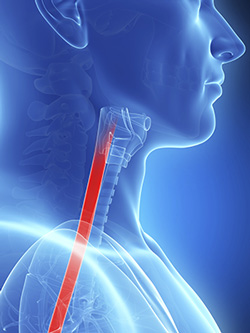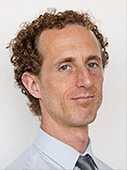Esophageal Cancer Specialist in Glendale, CA

The esophagus is a hollow tube made of muscle that carries food from your throat down to your stomach. The walls of the esophagus have several layers and are made up of different cells that can change and grow out of control as esophageal cancer (also called esophagus cancer).
Each year, about 18,000 people are diagnosed with this type of cancer and 14,000 of those are men. The condition is 3 to 4 times more likely in men than in women. Esophagus cancer makes up about 1% of all cancers in the United States, but the chance of dying from it is high. Only about 20% of people live five years after their diagnosis.1
Request more information on esophageal cancer: (424) 365-1800 or contact Dr. Jeremy Fischer online.
Esophageal Cancer Symptoms
In the early stages, you may not have any symptoms, but as the cancer advances you may have:
- Weight loss
- Coughing
- Difficulty or pain when you swallow
- Pain behind the breastbone in the middle of the chest
- Hoarse voice
- Indigestion or heartburn
Esophageal Cancer Causes and Risk Factors
Here are some risk factors that can raise your chances of esophageal cancer:
- Age 55 and older
- You are a man
- You have a history of Acid reflux disease (GERD)
- You have pre-cancerous changes in the cells that line your esophagus (also called Barrett's esophagus)
- You smoke or drink alcohol
- You are overweight or obese
- You have a history of lung, mouth, or throat cancer
Esophageal Cancer Screening and Diagnosis
Right now, there isn't a recommended screening test for people with average risk factors. For people who have a high risk, such as several risk factors or have Barrett's esophagus, your medical provider may want to use a special light and camera to check the inside of your esophagus. This test may be done frequently if you have places in your esophagus where the cells are not growing normally, but are not cancer (dysplasia).
To diagnose esophageal cancer, your medical provider may take a thorough history and complete a physical . Your provider will likely need to run some tests as well. These may include:
- Barium swallow X-rays (drink a liquid that coats the esophagus and that can be seen with an X-ray)
- Endoscopy (a light down the throat to look for signs of cancer)
- Biopsy (your provider will collect cells and examine them under a microscope)
If you do have cancer, your doctor may need to do additional tests or even surgery to find out if the cancer has spread and if so, how far. This is called staging.
Esophageal Cancer Treatment
Most esophageal cancers will be treated based on their stage, or how advanced they are and how far from the original cancer site any cancer cells have traveled. Treatment will usually need the skills of different types of medical providers including surgeons, oncologists , gastroenterologists and others.
Usually, treatment starts with a surgery to remove the part of the esophagus that has the cancer. From here, you may have and radiation treatments. You may have any of these treatments in a different order depending on where your cancer is in the esophagus, what type it is and how advanced it is, cancer staging .
Stage 4 esophageal cancers are the most advanced and the most difficult to treat. Curing the cancer isn't usually an option, and instead your provider may use chemotherapy and other treatments to help ease symptoms and keep the cancer under control for as long as they can.
Esophageal Cancer Support
Esophageal cancer takes the lives of 80% of those who get it within 5 years of the diagnosis. This means you may have a lot of emotions, fear and questions. Your medical provider will be able to offer options including support groups and information on palliative care (medical care to keep you comfortable). Make sure to ask questions and take along a friend or family member to help you listen to your provider's information or write down what they say so you can refer back to it as needed.
Request additional information on esophageal cancer today: Call (424) 365-1800 or contact Dr. Jeremy Fischer online.
1All statistics from American Cancer Society
Vitality Integrative Medicine
Address
4849 Van Nuys BlvdSuite 104
Sherman Oaks, CA 91403
(424) 365-1800
www.vitalityintegrative.com
Hours
Mon:
8:00 am - 6:00 pm
Tue:
8:00 am - 6:00 pm
Wed:
8:00 am - 6:00 pm
Thu:
8:00 am - 6:00 pm
Fri:
8:00 am - 6:00 pm
Sat:
8:00 am - 12:00 pm

